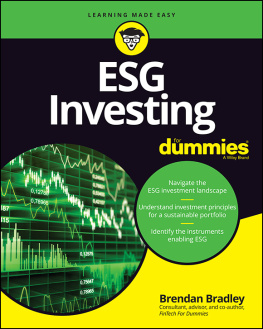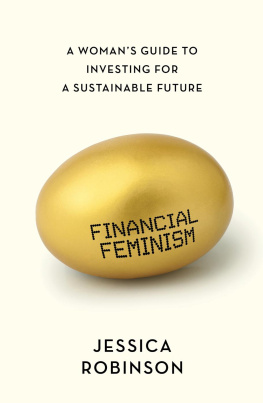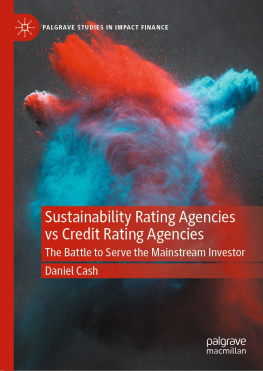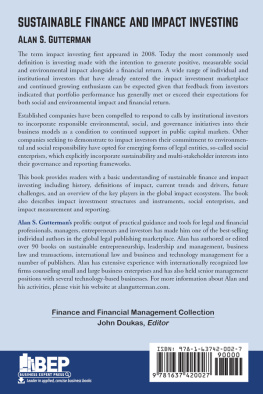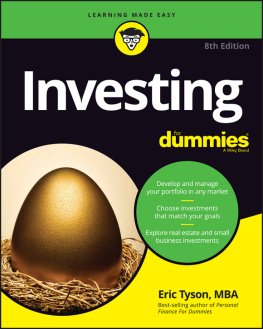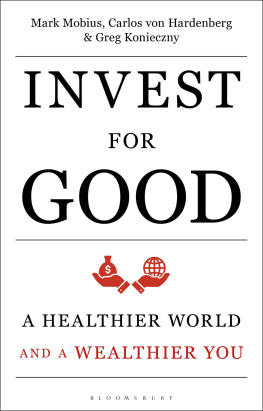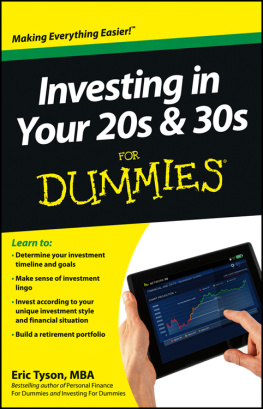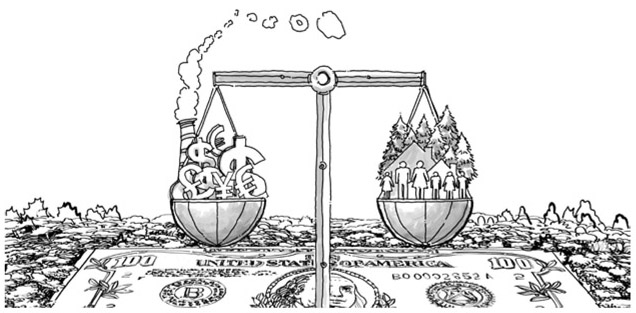R. Scott Arnell is the founding partner of Geneva Capital S.A., an alternative investment advisory firm based in Geneva, Switzerland specializing in sustainable and responsible investment opportunities. Since founding Geneva Capital, he has focused on mobilizing private equity investment into companies and investment funds primarily in Europe, Asia, and emerging/frontier markets. Prior to founding Geneva Capital, Arnell had over 20 years of international financial & business management experience serving in senior executive international financial and business operations management roles at multiple Fortune 500 companies in the consumer products, high-tech, and internet telecoms sectors. He has extensive business experience in Europe, Asia, and Latin America and lives in Switzerland, the Netherlands, and Mexico.
First, I must thank all of the investors whose professional experience, advice, and lessons form the essence of this book. You were all very gracious with your valuable time and so generous with your honest and candid insights. May everything you have shared in these pages inspire other investors to stand on your shoulders and build a more sustainable world for us alland for the generations that follow.
To the Geneva Capital team, Jay, Vicky, Marcus, and Stephen, many thanks for your research, for combing through endless hours of recordings, and for your detail-checking and support. Jay, your insights, and meticulous nature kept this project from going off the rails numerous times. Vicky, you cleaned our transcripts and put on the finishing touches, and for this I thank you.
To Tom Kerr, you are a warrior king with the red pen. When I couldnt see the forest for the trees, your suggested edits distilled these often-rambling conversations into something readable and understandable. You were always there for me. Thank you, thank you, thank you.
To Raoul Davis, who relentlessly pursued me until I did this book project, are we good now?
The American author F. Scott Fitzgerald wrote, There are no second acts in American lives. But I experienced a second act on a journey with my wife, Cathryn Arnell, as we dreamed and grew together. It has been everything I could have imagined and much, much more. You are an exceptional wife, my best friend and soul mate, a visionary leader, and a shepherd soul. Thank you for walking through this life with me.
Much of our world is in chaos. For many, multigenerational war is a way of life. Natural disasters are no longer the exception, they are commonplace. They shred our landscape, while simultaneously destroying and demanding more of our limited and valuable resources. Societal unrest tears at the seams of civilization. Hope that the worldwide web would bring people together now casts a shadow of cynicism, as social media accentuates and inflames tribal differences.
Financial markets prefer peace and quiet, because dont we all? In the absence of calm, those markets react the way we do, becoming imbalanced, distorted, and volatile. Sometimes panic ensues, triggered by a fight or flight reaction. Bubbles expand and burst, portfolios go bust, and people and their communities are subjected to painful economic step functions. Naturally, painful outcomes circle around to exacerbate and perpetuate the cycle.
But humans are incredibly adaptable. Soon we are no longer shocked or dismayed by screaming headlines and dire news broadcasts. The mind cant abide constant turbulence, so we acclimate with desensitization that moves the dial another degree toward numbness. Click the mouse, change the channel, swipe to the next story, and search for relief, for answers, for a positive reckoning.
Otherwise, its all a bit overwhelming and can send you into a funk. But the world around us reflects our own choices, our own decisions, and ultimately the actions we take day after day. We owe ourselves some thoughtful reflection of our own.
I am not a social scientist nor an economist, just someone whos paid some dues as he dragged his suitcase around the world to make a living in an international business career. Along the way, I accumulated a healthy amount of observations, traveling in a lot of different countries, on a regular basis over several decades. Some things have become vividly apparent: Despite amazing advances in technology, developing markets, increased access to information and improved productivity, we are witnessing huge, unintended consequences. They are clearly the result of large and complex global interdependencies that were not anticipatedand are still not well understood.
Im no Einstein, but anyone paying attention sees glimpses of what our future may look like should we continue down the same path without any course correction. As the real Einstein observed, We cannot solve our problems with the same thinking we used when we created them.
Socially, we are at a crossroads. If you get off track in the woods and go one way, you may be hopelessly lost by nightfall. Head in the right direction and youll be home in time to tuck your children into bed. Ive read that when making your final ascent to the top of Mount Everest, if you dont reach certain mileposts by a certain time of day, you wont make it back down before the temperatures plunge and you die of hypothermia. Despite knowing that, many climbers experience muddled thinking due to a dangerous mix of ambition and lack of oxygen. They proceed, convinced theyll make it and survive. But no one ever has.
Climate scientists plead with us to heed their warnings, which are supported by mountains of evidence. Meanwhile, the clock keeps ticking, were on a slippery slope, and time is of the essence.
Understanding and overcoming social and environmental challenges is moving to the forefront, as the most pressing matter of our current generation. Our planets sustainability and survival may depend on what we do, and how soon we do it. I believe we now need large-scale investment that offers competitive financial and economic returns fueled by mission-driven social and environmental solutions. A lot of people much smarter than me happen to agree.
ENTER SUSTAINABLE AND RESPONSIBLE INVESTING
In the early days of what was dubbed socially conscious investing, it was basically a strategy for eliminating the bad apples. Investors conducted negative screening, which meant avoiding investments in, to weed out specific companies and industries that did not align with positive social and environmental outlooks and outcomes. Those strategies ultimately led investors to sacrifice returns for values-oriented investment decisions.
In recent years, however, these investors have begun to screen investments to include those that actively drive constructive change forward. With an estimated global population increase of two billion people by 2050, the demands for food, energy, and water will inspire and propel innovative technology enhancements and additional investments in infrastructure to overcome those challenges. There are important trends already in motion that provide investors a heightened awareness of the impact of their financial investments. There is accelerated momentum toward the creation of proactive investment strategies that hold public companies and governments accountable for measurably improved social and environmental outcomes.
MIGRATING INTO THE MAINSTREAM
While this type of married to values investment approach has been around for some time, within the last several years it has gone mainstream. Sustainable ROI is not measured only monetarily but in ways that include the value of clean water, sanitation, energy generation and distribution, increased biodiversity, improved health care, more efficient transportation, and other similarly positive outcomes.



